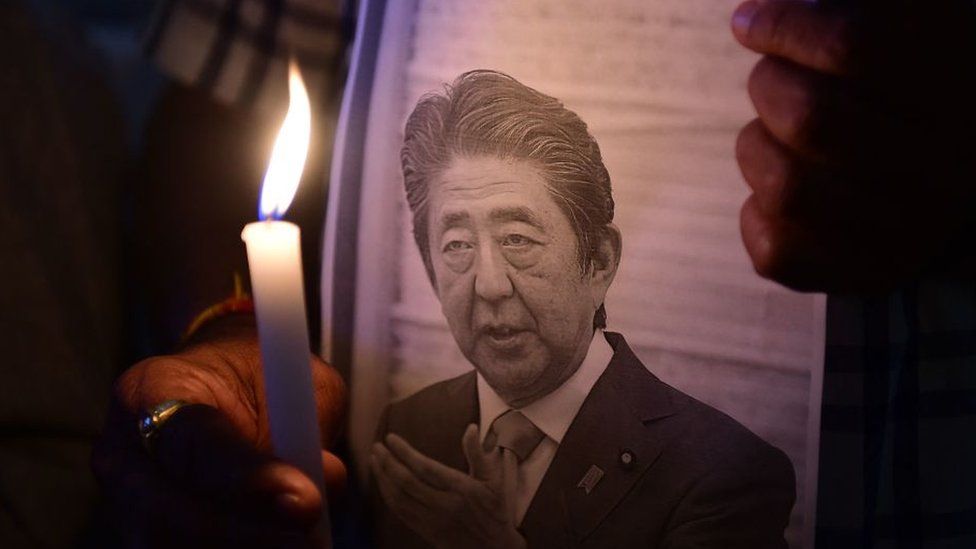Shinzo Abe killing: Why a religious group has been put in the spotlight
- Published

"I feel disgusted that I can relate to him but I can understand how he became isolated in society," says one man, whose mother is a member of a religious organisation, so he only wants to be known by his Twitter handle - @syuukyou2sei.
When Tetsuya Yamagami confessed that he decided to kill Japan's former prime minister because of Shinzo Abe's ties to a specific religious group, the phrase "Shukyo Nisei" started trending on social media.
The term literally translates to "religion second generation". It refers to children of parents who have joined a religious group.
The religious group now under the spotlight is the Unification Church, but children of those in other religious groups say they also feel impacted.
"I feel furious that Yamagami has put a spotlight on us in the worst possible way," @syuukyou2sei, who grew up in the Jehovah's Witnesses' faith, says.
"I wasn't allowed to celebrate birthdays. I wasn't allowed to sing a national or school anthem. I was forced to be part of their campaign to spread their faith."
When contacted by the BBC, a spokesperson for the Jehovah's Witnesses in Japan said they "respect the right of each individual to choose what they want to believe in", but "a parent's right to educate one's child based on his or her own belief is internationally recognised".
As soon as he turned 18 years old, @syuukyou2sei severed ties with his mother.
He says he doesn't get stigmatised because he doesn't tell people about her. But something as trivial as a colleague asking why he wasn't close to her can make him feel lonely.
"No one wants to be able to understand how Yamagami feels because what he has done is despicable. But I can imagine how he ended up holding a grudge against others."
Ties to politics
The Family Federation for World Peace and Unification - formerly named the Japan Unification Church - has since confirmed that Yamagami's mother has been a member since 1998.
She reportedly joined after her husband took his own life, leaving her to raise three young children on her own.
Yamagami told police he blames the group for bankrupting his mother.
According to lawyers who represent alleged victims, its followers lost at least 5.4bn yen ($39m; £33m) in the past five years. The organisation's Japan chairman Tomihiro Tanaka denies forcing its members to make donations.
"It is a religious group which started in South Korea, entered Japan in the 1960s and has a very sophisticated money-making operation," religion journalist Eito Suzuki explains.
"The group has caused societal problems with its spiritual-pressure sales and mass weddings, but politically it is anti-communist, and it is close to Japan's conservative politicians."
Mr Tanaka says the group has since changed, but lawyers claim otherwise - saying they still receive many complaints against them.
Most commonly, the group sends its followers as staff to work at politicians' offices, according to Mr Suzuki.
Lawyers representing its alleged victims say there were hundreds of its believers working for lawmakers - often unpaid - in the 1990s.
Mr Abe's relationship to the religious group has been rumoured especially on social media.
Part of the reason is because his grandfather, Nobusuke Kishi - who was also Japan's prime minister - was believed to have been close to it due to its anti-communist nature. And when Mr Abe appeared remotely as a speaker at an Unification Church-related event last September, Yamagami was convinced.
While there is no excuse for committing such a heinous crime, @syuukyou2sei says Japan has long ignored the human rights of the children of members of these religious groups.
"There is no system to protect us. Our constitutional rights - to believe in whatever religion we choose to - are oppressed, and yet, the government has long treated it as 'a family's problem'", he said.
Economically disenfranchised
The difficulty in getting social support also applies to others in hardship.
Forty-one years old and unemployed, Yamagami also belongs to what is known here as "the employment ice age".
He struggled to get a full-time job, and aside from several years that he spent at Japan's self-defence-force, he hopped around irregular work.
Japan is a society where going to a university and becoming a permanent employee has traditionally been defined as success.
People are often identified as belonging to a "winning" team ("kachi-gumi") or "losing" team ("make-gumi"). As Yamagami's background was revealed, online commenters were quick to judge him as "a typical losing team".
Many of Japan's recent violent crimes such as the 'Joker attack' were committed by unemployed men who held a grudge against society.
"When those in need try and get help, they are asked to work harder, and if that doesn't work, their families are expected to support them," says Hiroto Watanabe of a non-profit-organisation Posse, which focuses on youth poverty and labour issues.
"But if their families are broken up for whatever reasons - like the case of Yamagami, there is no one to help them and that is when people feel abandoned by the society," he added.
Japan is one of the world's safest countries but every few years, it is shaken by violent crimes like these.
And Yamagami's action has highlighted another group of people who feel desperately ignored and left behind in society.
Watch: video from the scene where former Japan PM Abe was shot
Related Topics
- Published8 July 2022
- Published8 July 2022
- Published12 July 2022